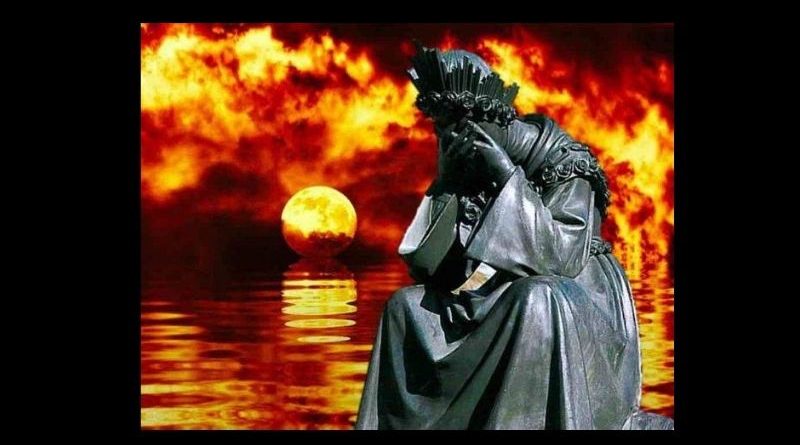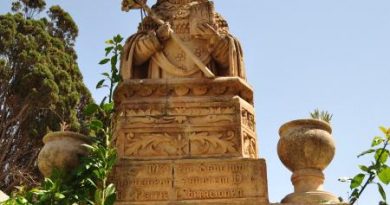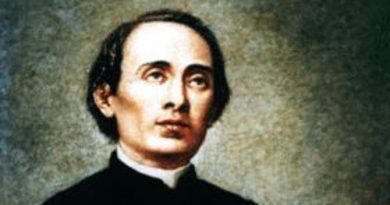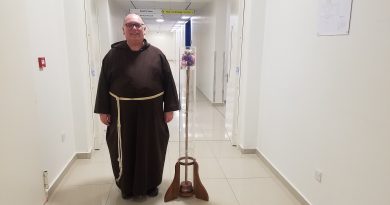Remind men of the existence of Purgatory
During the month of November we remember those brothers and sisters who presently are in Purgatory. As we all know, Purgatory is not at all a fancy place. Rather, it is a place of great suffering wherein souls suffer that agonizing absence of God.
In her Diary St Faustina gives us the following detailed description regarding Purgatory. In her entry number 20 she writes: “[The next night] I saw my Guardian Angel, who ordered me to follow him. In a moment I was in a misty place full of fire in which there was a great crowd of suffering souls. They were praying fervently, but to no avail, for themselves; only we can come to their aid. The flames which were burning them did not touch me at all. My Guardian Angel did not leave me for an instant. I asked these souls what their greatest suffering was. They answered me in one voice that their greatest torment was longing for God. I saw Our Lady visiting the souls in PURGATORY. The souls call her ‘The Star of the Sea.’ She brings them refreshment. I wanted to talk with them some more, but my Guardian Angel beckoned me to leave. We went out of that prison of suffering. [I heard an interior voice] which said, My mercy does not want this, but justice demands it. Since that time, I am in closer communion with the suffering souls (Diary, 20).
In another entry of her Diary, St Faustina keeps harping on the painful stay souls have to endure in Purgatory. She recounts:
“Once I was summoned to the judgment [seat] of God. I stood alone before the Lord. Jesus appeared such as we know Him during His Passion. After a moment, His wounds disappeared except for five, those in His hands, His feet and His side. Suddenly I saw the complete condition of my soul as God sees it. I could clearly see all that is displeasing to God. I did not know that even the smallest transgressions will have to be accounted for. What a moment! Who can describe it? To stand before the Thrice-Holy God! Jesus asked me, Who are you? I answered, “I am Your servant, Lord.” You are guilty of one day of fire in PURGATORY. I wanted to throw myself immediately into the flames of PURGATORY, but Jesus stopped me and said, Which do you prefer, suffer now for one day in PURGATORY or for a short while on earth? I replied, ‘Jesus, I want to suffer in PURGATORY, and I want to suffer also the greatest pains on earth, even if it were until the end of the world.’ Jesus said, One [of the two] is enough; you will go back to earth, and there you will suffer much, but not for long; you will accomplish My will and My desires, and a faithful servant of Mine will help you to do this. Now, rest your head on My bosom, on My heart, and draw from it strength and power for these sufferings because you will find neither relief nor help nor comfort anywhere else. Know that you will have much, much to suffer, but don’t let this frighten you; I am with you (Diary, 36).
Faustina’s Diary even encourages us to pray for the souls who are in Purgatory. In entry 58 Faustina explains thoroughly this important fact.
“One night, a sister who had died two months previously came to me. She was a sister of the first choir. I saw her in a terrible condition, all in flames with her face painfully distorted. This lasted only a short time, and then she disappeared. A shudder went through my soul because I did not know whether she was suffering in PURGATORY or in hell. Nevertheless, I redoubled my prayers for her. The next night she came again, but I saw her in an even more horrible state, in the midst of flames which were even more intense, and despair was written all over her face. I was astonished to see her in a worse condition after the prayers I had offered for her, and I asked, ‘Haven’t my prayers helped you?’ She answered that my prayers had not helped her and that nothing would help her. I said to her, ‘And the prayers which the whole community has offered for you, have they not been any help to you?’ She said no, that these prayers had helped some other souls. I replied, ‘If my prayers are not helping you, Sister, please stop coming to me.’ She disappeared at once. Despite this, I kept on praying.
After some time she came back again to me during the night, but already her appearance had changed. There were no longer any flames, as there had been before, and her face was radiant, her eyes beaming with joy. She told me that I had a true love for my neighbor and that many other souls had profited from my prayers. She urged me not to cease praying for the souls in PURGATORY, and she added that she herself would not remain there much longer. How astounding are the decrees of God!” (Diary, 58).
In Medjugorje, Our Lady told us the same thing when, in a 1983 message she said, when questioned about Purgatory:
“There is there, different levels of which the lowest are close to Hell and the highest gradually draw near to Heaven. It is not on all souls day, but at Christmas, that the greatest number of souls leave Purgatory. There are in Purgatory, souls who pray ardently to God, but for whom no relative or friend prays for them on earth. God makes them benefit from the prayers of other people. It happens that God permits them to manifest themselves in different ways, close to their relatives on earth, in order to remind men of the existence of Purgatory, and to solicit their prayers close to God who is just, but good. The majority go to Purgatory. Many go to Hell. A small number go directly to Heaven.”
These revelations only serve to accentuate what the Catholic Church already teaches about Purgatory’s existence. In her Catechism, Mother Church duly asserts:
“All who die in God’s grace and friendship, but still imperfectly purified, are indeed assured of their eternal salvation; but after death they undergo purification, so as to achieve the holiness necessary to enter the joy of heaven. The Church gives the name Purgatory to this final purification of the elect, which is entirely different from the punishment of the damned. The Church formulated her doctrine of faith on Purgatory especially at the Councils of Florence and Trent. The tradition of the Church, by reference to certain texts of Scripture, speaks of a cleansing fire: As for certain lesser faults, we must believe that, before the Final Judgment, there is a purifying fire. He who is truth says that whoever utters blasphemy against the Holy Spirit will be pardoned neither in this age nor in the age to come. From this sentence we understand that certain offenses can be forgiven in this age, but certain others in the age to come” (no. 1030-1031).
Moreover, the Church highly recommends the Eucharistic Sacrifice as the most privileged and effective means of help for the souls in Purgatory. “From the beginning the Church has honored the memory of the dead and offered prayers in suffrage for them, above all the Eucharistic sacrifice, so that, thus purified, they may attain the beatific vision of God” (no. 1032). In his post-synodal apostolic exhortation on the Eucharist as the source and summit of the Church’s life and mission, Sacramentum Caritatis, Pope Benedict XVI speaks about the Eucharist as the prayer for the dead. He says:
“The eucharistic celebration, in which we proclaim that Christ has died and risen, and will come again, is a pledge of the future glory in which our bodies too will be glorified. Celebrating the memorial of our salvation strengthens our hope in the resurrection of the body and in the possibility of meeting once again, face to face, those who have gone before us marked with the sign of faith. In this context, I wish, together with the Synod Fathers, to remind all the faithful of the importance of prayers for the dead, especially the offering of Mass for them, so that, once purified, they can come to the beatific vision of God. A rediscovery of the eschatological dimension inherent in the Eucharist, celebrated and adored, will help sustain us on our journey and comfort us in the hope of glory (cf. Rom 5:2; Tit 2:13)”(no.32).
All this makes perfect sense because, as Pope Francis rightly taught us in his General Audience catechesis of Wednesday 30 October 2013: “All baptized persons here on earth, the souls in Purgatory and all the blessed who are already in Paradise make one great Family. This communion between earth and heaven is realized especially in intercessory prayer”.
Let us keep showing a true love for our dear and special neighbours, the holy souls in purgatory! Let us make them profit from the many masses we celebrate for them and take part in here on earth! Let us never cease offering masses for the souls in Purgatory! As the principal biblical maxim preached by Jesus goes: Love your neighbor as yourself (Matt 5:43; 19:19; 22:39; Mark 12:31; ) applies also to praying for the souls in Purgatory by offering masses for them.
What a fruitful way to remind ourselves and those around us that Purgatory do exist and how it is urgent that it be emptied as soon as possible!
Fr Mario Attard OFM Cap





